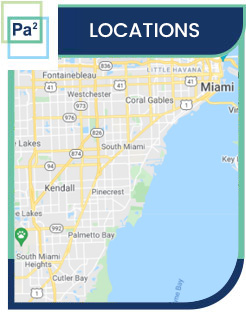Asthma Treatment Specialist in Palmetto Bay, FL
Don’t suffer from asthma and visit board-certified allergist Dr. Carlos Piniella, MD at Piniella Asthma + Allergy in Palmetto Bay, FL. Our experienced allergist and friendly doctors look forward to helping you feel your best! For more information, contact us or schedule an appointment online. We are conveniently located at 9275 SW 152 Street, Suite 210 Palmetto Bay Village, FL 33157.


Table of Contents:
What are the causes of asthma?
Are there things I can change in my life to reduce my risk of an asthma attack?
What kinds of tests will I need to monitor my asthma?
What kind of inhalers do I need?
How do I use an asthma inhaler?
How Piniella Asthma + Allergy can help with asthma?
Finding a highly skilled doctor to help you with your asthma treatment can be difficult. Fortunately, the board-certified allergist at Piniella Asthma + Allergy is available five days a week at convenient hours to assist with your asthma treatment. Our doctors and allergists have years of experience and can help you manage this condition. If you aren’t pleased with the efforts of your current doctor, visit our asthma specialist today for a consultation. While asthma has no cure, there are several ways to treat it so you can manage this condition.
There is no clear answer on what causes asthma or why it only affects some people and not others. Most likely it is caused by genetic factors and environmental factors. While there is no clarity on what causes someone to suffer from asthma, the triggers for an asthma attack or asthma symptoms are fairly well known. These triggers will vary from one person to the next, as will the severity of their symptoms when they have come into contact with the triggers. Asthma symptoms can be triggered by physical activity, respiratory infections, cold air, air pollutants and irritants, certain medications, airborne allergens, stress and strong emotions, gastroesophageal reflux disease, and preservatives and sulfites added to some foods and drinks. Your chances of developing asthma appear to be increased by the following factors: a parent or sibling having asthma, suffering from an allergic condition, being overweight, smoking, second-hand smoke exposure, exposure to air pollutants such as exhaust fumes, and occupational triggers found in chemicals used for manufacturing, hairdressing, and farming.
Determining the causes of your asthma attacks is the first step to changing any facets of your life to reduce the risk of future asthma attacks. Working with your doctor to figure out what you were doing prior to having an attack will help pinpoint the cause. From there you and your doctor or asthma specialist can talk through options to help control it or avoid your triggers, such as avoiding chemicals that aggravate it, reducing your exposure to air pollutants, losing weight, and maintaining good hygiene to avoid catching colds or flu. Asthma attacks are treatable with a rescue inhaler, which your doctor can prescribe to you for emergency use. You and your doctor should review your asthma treatment plan on a regular basis to ensure your asthma is staying under control. If you are seeing an increase in the frequency of your asthma attacks, the symptoms are getting worse, the inhaler isn’t helping as much as it used to or you are on new medications, your doctor may need to change up your treatment plan.
Asthma sufferers can have lung function tests performed to see how well the lungs are working. These tests can also be used to know how well your current lung treatment is working or in an asthma emergency to determine the severity of the attack. There are 4 different types of lung tests – peak flow, spirometry, nitric oxide measurement, and pulse oximetry. A peak flow test is used to measure how quickly you are able to breathe out. It can be used during a scheduled doctor’s visit, during an asthma attack as part of your treatment or to monitor lung function at home. The test involves blowing a single breath as hard and fast as you can into a mouthpiece. Spirometry can measure your lung capacity as well as the rate of your inhale and exhale. For this test, you take deep breaths, then exhale as hard as you can into the hose connected to the spirometer. A nitric oxide measurement is used to measure how much nitric oxide gas is present in your breath when you exhale. High levels of nitric oxide are an indication of inflammation in your bronchial tubes. The amount of oxygen in your blood is measured through a pulse oximetry test. It takes a matter of seconds and is measured through your fingernail.
An asthma inhaler is a small portable device that can be used to provide you with a dose of medication right into your lungs. There are a variety of kinds available to help you control your asthma symptoms and can be used to treat or prevent asthma attacks. You may need to try a few different types before finding the one that works best for you. Your doctor can help you with the correct use of an inhaler to ensure the medication is getting into your lungs as intended. Metered dose inhalers are the most commonly used and easily recognized. They are made of a plastic boot-shaped mouthpiece that fits easily into the palm of your hand. The medication comes in a pressurized canister that sits upside down in the mouthpiece, with the medication being released by pushing the canister down into the mouthpiece. The asthma sufferer then breathes the medication in as they push down on the canister. Metered dose inhalers contain a certain number of doses per canister, so users have to keep track of how many doses they have used, but can do so through an app, a built-in counter on the inhaler, or another method to ensure that they don’t run out of doses when you really need it. There are also dry powder inhalers that release the medication when you breathe in a fast, deep breath and a soft mist inhaler that release a low-velocity aerosol mist. There are also face mask options available for small children and infants, or anyone else who struggles with a conventional inhaler.
Your asthma specialist will give you training on the proper use of your inhaler to ensure the medication is getting to your lungs. They can work with you on the best inhaler for you, providing you with the different options available and finding the one that is best suited for your needs. When using an inhaler, you will need to breathe the medication in through your mouth to allow it to work its way to your lungs.
At our asthma and allergy center, we can treat your asthma by:
• Identifying the triggers
• Medication (for quick relief and long-term treatment)
• Immunotherapy (allergy shots)
Our highly skilled and board-certified allergist will work with you one-on-one to identify what exactly triggers your asthma attacks. Once narrowed down, we’ll develop a plan for you to avoid those triggers. Avoiding them will reduce the chances of an asthma attack. When avoiding allergens and irritants just isn’t possible, there are several medications out there that can provide immediate relief. However, these are just short-term solutions.
Long-term medications are taken regardless if you are showing any symptoms or not. You will work with our doctors to help fine-tune the dosage, so you can feel the best with the lowest possible dosage so that you don’t suffer any possible side effects. Immunotherapy, also known as allergy shots, trains your body to resist and develop a tolerance for the triggers of asthma. What will work best for you? Every patient is different, so it’s vital you talk with our allergists to help develop the best-customized treatment for your asthma. Piniella Asthma + Allergy in Palmetto Bay is located at 9275 SW 152 Street, Suite 210, Palmetto Bay Village, FL 33157. We are open Mon-Fri 9am-5pm, Tues-Thur 8am-6pm, Wed 8am-5pm. We accept most major insurances including United Health Care, Tricare, Medicare, Medicaid, Blue Cross Blue Shield, and Aetna. For a complete list of insurance carriers we work with, please visit our insurance page. Don’t see your company listed on our website? Call our friendly staff at (305) 204-6787, and we’ll research what your options are. We look forward to helping you breathe a little easier. The board-certified doctors at Piniella Asthma + Allergy look forward to meeting you! We serve patients from Coral Gables FL, Palmetto Bay FL, Westchester FL, Brownsville FL, Kendall FL, Pinecrest FL, Richmond West FL, and Goulds FL.

Additional Services You May Need
▸ Asthma
▸ Allergy Testing
▸ Food Allergies
▸ Immunotherapy
▸ Patch Testing
▸ Allergy Treatment
▸ Pediatric Asthma Specialist
▸ Pediatric Allergist
▸ Insect Bite Allergy
▸ Drug Allergy
▸ Seasonal Allergies
▸ Skin Allergy

Additional Services You May Need
▸ Asthma
▸ Allergy Testing
▸ Food Allergies
▸ Immunotherapy
▸ Patch Testing
▸ Allergy Treatment
▸ Pediatric Asthma Specialist
▸ Pediatric Allergist
▸ Insect Bite Allergy
▸ Drug Allergy
▸ Seasonal Allergies
▸ Skin Allergy


